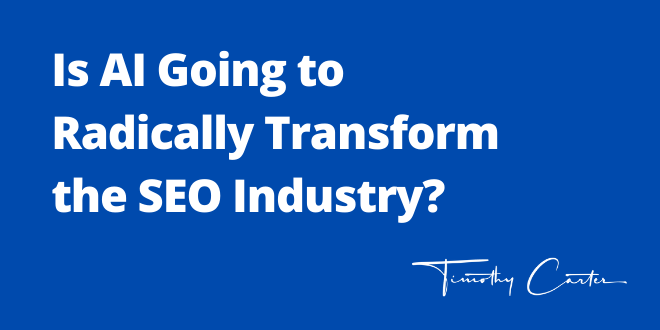
Why Are Most SEO Campaigns Unsuccessful?
October 16, 2021
How to Keep Your Startup Team Adaptable
October 27, 2021Artificial intelligence (AI) is working its way into every imaginable industry. With it, we’re opening the door to automation, better data analytics, higher productivity and a host of other business benefits. But we’re also seeing radical industrial transformations, with some market segments reinventing and redefining themselves in the wake of this new technology.
AI is already here, at least in some contexts, in the search engine optimization (SEO) industry. Should we be bracing for an industry-wide overhaul? Or is AI simply going to improve our already existing capabilities, without many long-term fundamental changes?
AI in the SEO industry
There are a few main areas where AI is influencing the SEO industry today, including:
- Algorithm changes and the pace of search engine development. First, major search engines like Google are beginning to integrate elements of AI and machine learning into their algorithms. Starting with RankBrain in 2015, Google announced it would be using machine learning to refine its ability to provide relevant, authoritative search results; RankBrain, specifically, works to better understand user intent in ambiguous queries, but the future potential of AI in search algorithms is practically limitless.
- GPT-3 and AI-based writing. GPT-3 and similar AI tools are increasingly being used to tackle repetitive writing jobs. Even amateur marketers know that content is the heart of any SEO strategy, and certain machine learning algorithms are becoming capable of replicating human-level writing at scale. However, this technology is still in its infancy.
- Data analytics, predictive models and recommendation engines. AI and machine learning are also being utilized for data analytics, predictive models and recommendation engines. Effectively trained AI systems can better analyze the competition and search volume of keywords, scrutinize the technical aspects of your website and even recommend specific changes to make to see better results. These benefits are going to become even better in the future. However, they don’t have much potential to be fundamentally disruptive; they’re in a position to empower and support optimizers, rather than displacing them, replacing them, rendering them unnecessary, or redefining their roles.
- Task automation. In possibly the simplest application, AI and machine learning can be used for basic task automation. If you’re doing something predictable and repetitive, such as following a specific formula for writing meta descriptions for all your pages, you can simply automate it with the right AI tool. This is something that can be used by nearly all businesses in all industries.
AI and algorithm updates
How much of an impact with AI and machine learning have on algorithm updates in the future?
That depends on how you define “impact.” Right now, AI is being used to continually polish and refine Google’s algorithms; it’s learning new things and posting new, minor updates on a constant basis. This is being done at a rate much faster than what a human being would be capable of manually.
However, based on our current understanding, these AI tools are only being used to execute human direction. Google isn’t evolving dramatically or in unpredictable new directions; it’s simply getting better at doing what it’s always wanted to do. Accordingly, while Google search results are getting better for users and Google is saving time and money in the process, this isn’t currently having a huge impact on the SEO industry — nor does it look like that will change in the future.
AI and writing
A more interesting AI application in SEO is AI-based writing. Content writing is arguably the most important element of any SEO strategy, and it tends to be the most expensive as well. Sufficiently high-quality AI writing could put millions of writers out of jobs while saving companies tons of money — and inundating the web with amazing written material at the same time. Right?
Not exactly. Although it’s hard to say what the future of AI-based writing is, as it stands, AI writing algorithms are extremely limited. They can handle repetitive and low-level writing tasks, but even then, it pays to have a human editor review and polish the work. For the high-quality, in-depth strategic content necessary for SEO success, human writers will remain necessary for the foreseeable future.
Future capabilities
Of course, it’s hard to say with any measure of certainty what the future holds for AI. The rate of technological development tends to be exponential, and many of the sophisticated technologies we enjoy today would have been fundamentally unpredictable just 50 years ago. In the next few decades, we may seem major breakthroughs in the realm of AI and machine learning that completely reset our expectations.
That said, we can definitively predict the course of AI development and its impact on the SEO industry for at least the next several years. Considering AI has already worked its way into the industry and is being used by most of the major players, we can anticipate further iterative advancements to these tools. We can also predict that our current generation of AI isn’t capable of completely displacing or replacing human workers; instead, it’s going to remain a powerful tool in the average search optimizer’s arsenal. As such, we can’t predict a “radical transformation” in the near-term future.
Originally appeared in Entrepreneur





